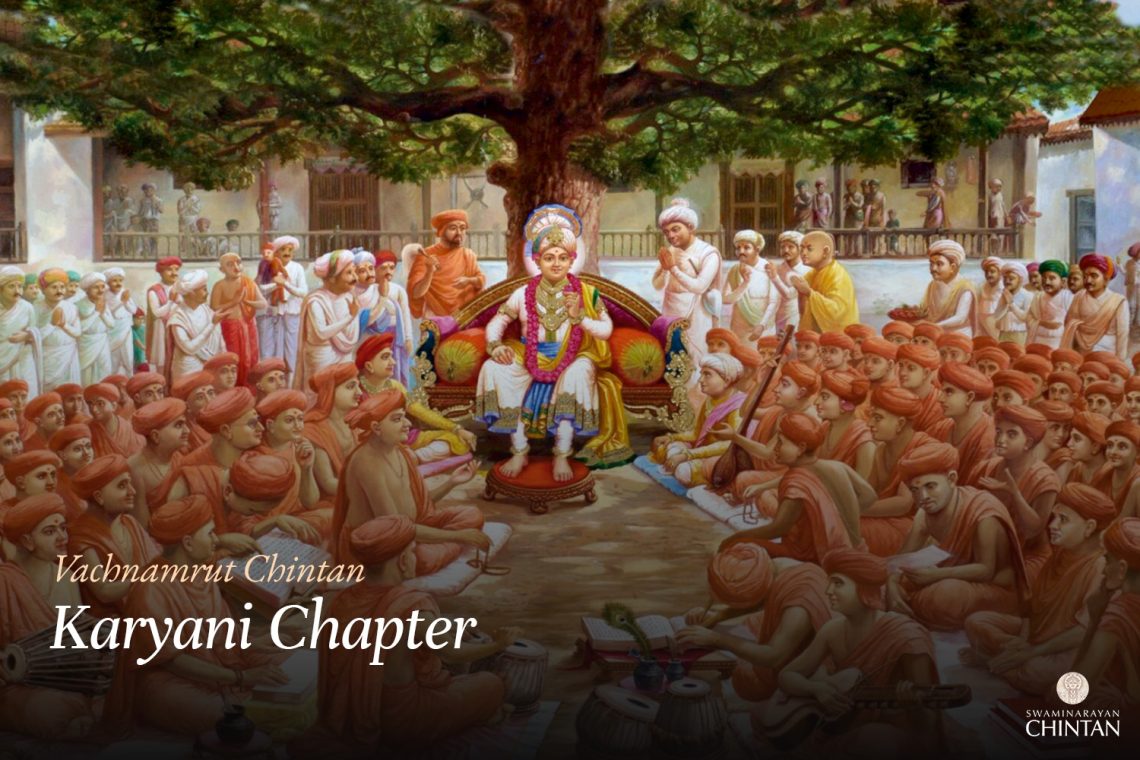Central Insights:
- The destruction of the Karan (causal) body.
Main Points:
- By meditating on the image of Bhagwan and reflecting on His words in the heart, the Karan body is destroyed.
- Listening to spiritual discourses with devotion and reflecting on them leads the mind to become free from worldly desires (the Karan body becomes hollow).
Commentary:
This Vachanamrut discusses the analogy of tamarind seeds or the destruction of the Karan body. Here, the Jiva’s Karan body is compared to the shell of a tamarind seed. This analogy is highly appropriate and provides a deep understanding. The more this analogy settles in our hearts, the easier it becomes to comprehend the relationship between the Jiva and its Karan body, and the means of separating the two.
The relationship between the Karan body and the Jiva is considered eternal. Just as we cannot determine when the shell first adhered to the tamarind seed, we cannot pinpoint the moment this relationship began. Since the creation of the seed, the shell has also existed. Similarly, here, the Jiva is eternal, and so is the Karan body. Just as the shell sticks firmly to the seed, the Karan body is strongly attached to the Jiva. However, when the seed is roasted in fire, the shell separates. In the same way, by meditating on the image of Bhagwan and reflecting on His words in the heart, the Karan body separates from the Jiva through the fire of contemplation. As long as the shell remains attached to the seed, the seed will continue to sprout. Similarly, until the Karan body and the Jiva separate, the cycle of birth and death continues. Hence, there are many similarities between the two.
In this Vachanamrut, Maharaj says that the Karan (causal) body is the Jiva’s Maya. It manifests as the Sukshma (subtle) body. Therefore, the three types of bodies—Sthool (physical), Sukshma, and Karan—are all forms of the Jiva’s Maya. The attachment of the ego (“I”) and possessiveness (“mine”) to these bodies is what constitutes Maya for the Jiva. Similarly, the three bodies—Virat, Sutratma, and Avyakrut—are the Maya of Ishwar. The Jiva’s Maya, in the form of the Karan body, is as hard as a diamond and cannot easily be separated from the Jiva. When can it be destroyed? Only when a person comes into contact with a Sant and realizes the true form of Bhagwan through the words of that Sant. By meditating on the form of Bhagwan and reflecting on His words in the heart, the Karan body burns away, becoming hollow, like an empty shell. Just as the shell of a tamarind seed falls off when roasted, no matter how many other methods are tried, the Karan body—representing ignorance—cannot be destroyed.
Maharaj then asked the Munis a question: “In the waking state (Jagrat), Sattvagun predominates, and one has clear knowledge of all things. However, even when a person contemplates in the Sukshma body (mind or intellect) on what was heard in the waking state, it becomes firmly fixed. Yet, in the Sukshma body, Rajogun predominates, and Rajogun is usually associated with unclear or distorted knowledge. So why is it that when one reflects in the Sukshma body, knowledge becomes accurate?” The Munis were unable to answer this question. Then Maharaj explained, “The Antahkaran resides in the heart, and the Kshetragna, or soul, resides within it. The Kshetragna is the force behind all the senses and the Antahkaran. Since the Antahkaran is closer to the Kshetragna, when contemplation occurs in the Antahkaran, the knowledge becomes more firm. This is because the Kshetragna is more powerful, and whatever it affirms becomes deeply ingrained.”
Additionally, Maharaj said that no matter how much lust, anger, greed, or desire for indulgence a Jiva may have, if they listen to such spiritual discourses with faith and love, all their vices will be eliminated. In this way, the Jiva becomes separated from the Karan body. Maharaj explains that even if someone is deeply attached to lust or other vices, if they listen to such spiritual talks with devotion and faith, they will no longer desire the pleasures of the senses.
Glossary
| Karan Body – Causal body |
| Jeev – Soul The individual consciousness or self, which is distinct from the body and mind but bound by the influences of Maya. |
| Maya – Illusion The material energy that entangles the Jeev in worldly existence and distracts from Bhagwan. |
| Sthool Body – Physical body |
| Sukshma Body – Subtle body The mental and subtle faculties, such as the mind, intellect, and ego, that are formed as part of the soul’s experience and journey. |
| Virat – Cosmic body of Ishwar |
| Sutratma – Subtle body of Ishwar |
| Avyakrut – Causal body of Ishwar |
| Antahkaran – Inner faculties The mind, intellect, consciousness, and ego, which help in acquiring spiritual knowledge. |
| Kshetragna – Knower of the field The soul or consciousness that perceives and supports the body (Kshetra). |
| Tapas – Austerities |
| Rajogun – Mode of passion The quality associated with activity, desire, and attachment. |
| Sattvagun – Mode of goodness The quality associated with purity, knowledge, and harmony, leading to self-realization. |
| Contemplation – Deep reflection |
| Tamarind Seed Analogy – Metaphor for Jeev’s bondage The Karan body sticks to the Jeev like a tamarind shell until it is burned away by meditation and knowledge. |

